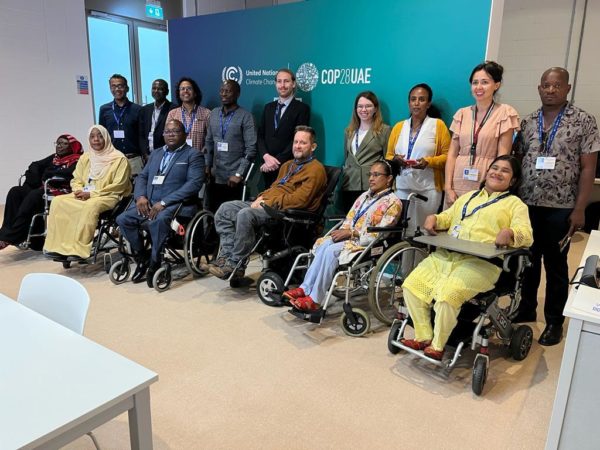The 28th Conference of the Parties (COP28) to the UN Framework Convention on Climate Change took place between 30 November and 13 December 2023, in Dubai (United Arab Emirates). A delegation from the Forum participated in a part of the Summit.
State Parties reached an agreement to fund assistance for those most impacted by climate change (Loss and Damage Fund) and concluded the first global stocktake of climate action, adopting a decision to “transition away from fossil fuels in energy systems” towards climate-neutral energy systems.
Disability inclusion at COP 28
This Summit witnessed an increased presence of disability advocates and more discussion on disability issues.
We, together with other organisations such as the International Disability Alliance, participated in and organised many events and bilateral meetings with climate negotiators and stakeholders. The Disability Caucus – the informal group representing the disability movement at COP 28 – coordinated its message to strengthen the move towards inclusive and effective climate action.

As a result of this advocacy effort, the COP 28 main outcome document (the first ever ‘global stock-take’) explicitly refers to persons with disabilities by acknowledging that Parties should respect, promote and consider their respective obligations on human rights, including the rights of persons with disabilities when taking action to address climate change.
The same is true for the agreement on the Loss and Damage Fund and on the Just Transition work programme, where Parties also recognise the importance of respecting and promoting the human rights of persons with disabilities.
The Key requests of the Disability Caucus at COP 28
Persons with disabilities are disproportionately impacted by climate change. Women, children, youth with disabilities and Indigenous persons with disabilities are among those at greatest risk. The meaningful participation of persons with disabilities and their representative organisations is therefore essential during occasions such as the COP28. It is a legal obligation under the United Nations Convention on the Rights of Persons with Disabilities (CRPD).
Persons with disabilities, especially those impacted by climate change, bring unique experiences and knowledge to the table of climate negotiations. They are key actors in supporting the transition towards accessible, just, and inclusive societies.

However, we are a long way from achieving this goal. As an example, 80% of States Parties to the Paris Agreement do not include any reference to persons with disabilities in their Nationally Determined Contributions (NDCs). Nationally Determined Contributions are the plans that show each country’s efforts to reduce national emissions and adapt to the impacts of climate change.
During the COP 28’s final statement, Juan Ángel De Gouveia Fernández, on behalf of the Disability Caucus, called on:
- Parties and the United Nations Framework Convention on Climate Change (UNFCCC)Secretariat to guarantee full and effective participation of persons with disabilities and their representative organisations in UNFCCC processes and decisions.
- All States to plan their Nationally Determined Contributions in line with the human rights-based approach to disability and in consultation with persons with disabilities and their organisations.
- The allocation of specific funds as well as mainstreaming disability-related costs in the finance for loss and damage.
- Improvement regarding accessibility for participation in COP 28 and future COPs. These include sign language interpretation and captioning, and multiple formats for navigation signage and information.
More information
For further information, please contact Gordon Rattray, EDF programme coordinator, or Giulia Traversi, EDF Humanitarian Policy Officer.